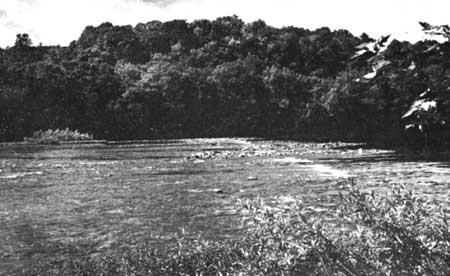|
ANTIETAM National Military Site |
 |

Blackford's Ford from the Maryland side of the
Potomac.
Retreat from Sharpsburg
Seldom had Lee's army fought a battle so strenuous and so long. "The sun," a soldier wrote, "seemed almost to go backwards, and it appeared as if night would never come." From dawn to sunset, the Confederate commander had thrown into battle every organized unit north of the Potomac. Straggling in the days preceding Antietam had reduced Lee's army from 55,000 to 41,000 men. This small force had sustained five major attacks by McClellan's 87,000-man army—three in the West Woods and the Miller cornfield, and those at the Sunken Road and the Lower Bridge—each time the outcome hanging in the balance.
In the stillness of the night, Lee called his commanders to his headquarters west of Sharpsburg. Of each in turn he asked the condition of the men, and each, even Jackson, spoke against renewal of battle on the morrow. "Still too weak to assume the offensive," Lee wrote later, "we waited without apprehension the renewal of the attack."
Early on the following morning, it became apparent that McClellan was not going to attack, though during the night he had received strong reinforcements, and more were on the way. Still undaunted, Lee returned to his plan of striking the Federal right at Poffenberger Ridge. But after surveying the ground, his officers informed him that Federal batteries completely dominated the narrow strip of land over which the attack must be launched. An attempt against the Federal guns would be suicidal.
Balked in his last hope of a counteroffensive, Lee realized that he could not recall the decision won by McClellan at South Mountain: The campaign was lost. During the afternoon, he announced to his lieutenants his intention of withdrawing that night across the Potomac. At midnight Longstreet led the way across Blackford's Ford and formed a protective line on the south bank. Steadily through the night and early morning, the Confederate columns crossed over into Virginia.
McClellan did not actively pursue. As the days passed and Lee's army withdrew into the Shenandoah Valley, President Lincoln became impatient. The time was at hand, he thought, for the decisive blow. Calling upon McClellan on the field of Antietam October 1, Lincoln urged a vigorous pursuit of the Confederate army. McClellan insisted that his army required reorganization and new equipment. The President, having lost all confidence in McClellan, removed him from command on November 7.

|

|
|
Last Modified: Mon, Mar 4 2002 10:00:00 pm PDT |


